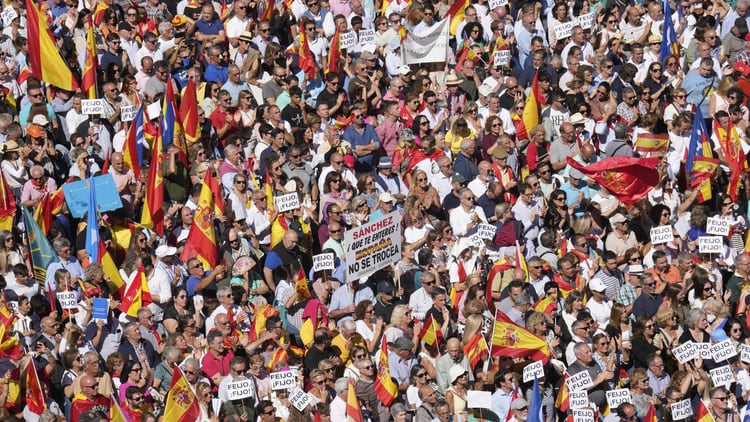Ángel Collado
The president of the PP will face tomorrow in Congress an investiture session as an aspiring head of the Executive that he takes for granted will fail due to the block rejection of the left-wing parties represented in the Chamber plus the pro-independence groups.
The previous commitments or the current advances in the negotiation between Pedro Sánchez and the Catalan separatists at the expense of national unity lead Alberto Núñez Feijóo to be the next head of the opposition even though he heads the majority group and to begin his task preventively in defense of the constitutional framework as he already did this Sunday in Madrid in a massive demonstration that exceeded the forecasts of the PP itself.
Two months after the general elections of July 23rd, Feijóo still cannot count for his investiture with more than the 137 deputies of the PP, the 33 of Vox plus two regionalists, one from Navarra and another from the Canary Islands. With 172 votes in favor, he remains 4 seats short of the absolute majority needed in the first vote to be elected President of the Government and he already has the predisposition of the vice-president and successor of Pablo Iglesias, Yolanda Díaz, plus the 6 seats of Bildu, the heir of the political arm of ETA.
The disadvantage of the socialist leader against the center-right bloc can only be covered with the 5 seats of the PNV, the 7 deputies of ERC (his usual allies in the last legislature) plus the 7 of the party of the former president of the Catalan Generalitat, Carles Puigdemont.
As the PNV, a traditionalist right-wing formation as well as nationalist, discards descantarse by Feijóo, and even abstain; the fugitive from Justice and main head of the secessionist attempt of October 1, 2017 holds the key for Sanchez to remain in power. Puigdemont asks in exchange for an amnesty law for his own benefit and that of all those involved in the coup that he already takes for achieved without Sánchez daring to contradict him, a clear path for the secession of Catalonia and more tax and investment privileges before the final breakup.
The unconstitutional demands of the separatist leader pending trial, from judicial impunity to the rupture of national unity and the democratic regime born in 1978, are the script on which Sanchez works to reissue his formula of “progressive government” (of socialists and communists) of the last legislature that now will have to be helped by the Catalan and Basque independentists and supremacists.
With the amnesty for the coup plotters discounted even if it is going to have another title, the PP has turned in recent weeks to call on the Socialists to dare to make public their disagreement with the plans of their current leader against the very Democratic Transition in which the PSOE was a prominent protagonist.
The old guard of the party, with Felipe González (president of the Socialist Government between 1982 and 1996) at the head, has clamored against Sánchez’s drift without the latter being moved except to expel another veteran, Nicolás Redondo, for criticizing his surrender to the pro-independence supporters.
Faced with this scenario and given the unfeasibility of his investiture this week in Congress, Feijóo surrounded himself this Sunday with the main leaders of his party, most of them at the head of regional and municipal governments, and the former presidents of the Government Mariano Rajoy and José María Aznar, to present himself as head of the opposition to the Sanchez government that is feared to come: that of the constitutional overflow.
The president of the PP staged the event to demonstrate the unity of his party without generational differences in the face of the division of the PSOE and its power in the autonomous power (11 regional presidents gathered) compared to that of the socialists: only two presidents of autonomous regions and one of them, Emiliano García-Page, openly against Sánchez.
The message was clear and will be the core of Feijoó’s intervention tomorrow in Congress: it is up to the PP to become a reference of constitutionalism and the defense of democratic and constitutional principles (equality among Spaniards) against the plan of privileges for the “pro-independence elites” with which Sánchez wants to ensure his own investiture.







